イベント&アクティビティ
Barbara Holthus interviewed about Olympic volunteers
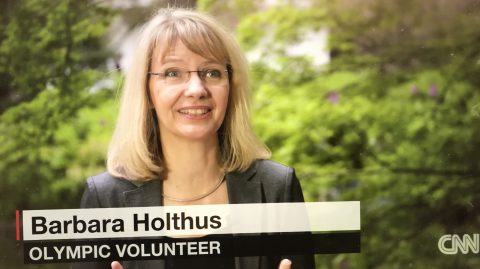
Three months before the scheduled opening of the Tokyo Olympics, DIJ deputy director Barbara Holthus was interviewed by Japanese and international media about Olympic volunteers. In Fuji TV’s news show ‘Viking More’, Barbara explained that volunteers are provided only with insufficient measures to protect against a Covid infection. There are also neither PCR testing nor vaccinations planned for volunteers. In the Japanese daily Mainichi Shinbun, she commented that the Games should not be held in the midst of the pandemic as they would neither have the expected economic impact nor create a positive legacy. Barbara also appeared on a CNN TV programme which was broadcast 100 days before the scheduled opening of the Games on April 14. What was meant to be a “once-in-a-lifetime” opportunity has now turned into “a really dangerous experience,” she said. The video can be viewed here. For more information on research related to the Olympics, see the DIJ’s special project on the Tokyo Olympics and the open access book publication Japan Through the Lens of the Tokyo Olympics.
Barbara Holthus quoted in international media about Tokyo Olympics
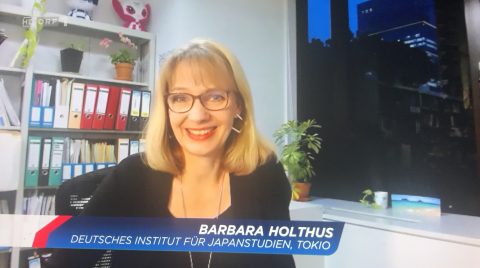
As the Olympic torch relay started this week, the Tokyo Olympics are back in the focus of international media. DIJ deputy director Barbara Holthus was interviewed and quoted by several media about the current mood in Japan towards the Olympics. For CNN International, Barbara comments on Japan’s lost opportunity to re-imagine itself and get an economic boost from Olympia-related tourism. In the New York Times, Barbara explains how the 110,000 volunteers are being prepared for their roles at the Games during the pandemic. In Austrian TV’s ORF Sport am Sonntag, she comments on the exploding costs and the likelihood of the Olympics going ahead as scheduled. For an AP News article, Barbara contextualizes the recent scandals over sexist comments. In Deutsche Welle, she explains why the decision to exclude foreign spectators is a concession to the Japanese people who have become increasingly skeptical of the Olympics. For more information on research related to the Olympics, see the DIJ’s special project on the Tokyo Olympics and the open access book publication Japan Through the Lens of the Tokyo Olympics.
Barbara Holthus interviewed about 3.11 by German newspaper
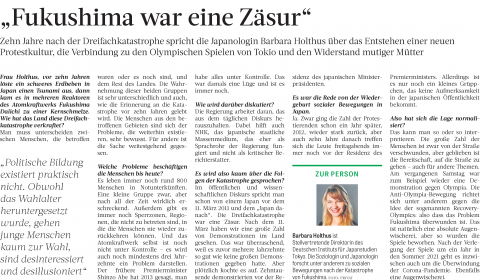
The German newspaper Frankfurter Rundschau has interviewed DIJ deputy director Barbara Holthus about the continuing effects of the ‘triple disaster’ on Japanese society. In “Fukushima war eine Zäsur” (Fukushima was a watershed), Barbara explains how 3.11 has caused the rebirth of social movements in Japan, increased mistrust of the Japanese government and of mainstream media, and also influences the critical attitude of many Japanese towards the Tokyo Olympics. “The anti-Olympics movement is directed, among other things, against the idea of the so-called Recovery Olympics: that the problem of Fukushima has been overcome. Of course, this is absolute eyewash, but that’s how the Games were advertised”. Barbara’s current research includes projects on Social movements and gender in post-3.11 Japan and a special project on the Tokyo Olympics. The newspaper article appeared online and in the FR‘s print edition on March 10. A collection of DIJ research and publications related to 3.11 is available here.
Wir suchen Verstärkung in Wissenschaft und Verwaltung
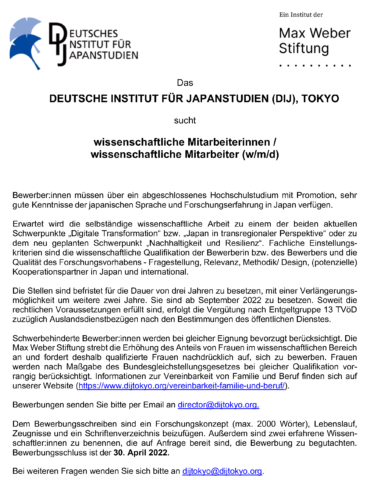 Das DIJ sucht wissenschaftliche Mitarbeiterinnen/Mitarbeiter (w/m/d) mit einem abgeschlossenen Hochschulstudium mit Promotion, sehr guten Kenntnissen der japanischen Sprache und Forschungserfahrung in Japan. Erwartet wird die selbständige wissenschaftliche Arbeit zu einem der beiden aktuellen Schwerpunkte „Digitale Transformation“ bzw. „Japan in transregionaler Perspektive“ oder zu dem neu geplanten Schwerpunkt „Nachhaltigkeit und Resilienz“. Die Stellen sind ab September 2022 zu besetzen, Bewerbungsfrist ist der 30. April 2022. Die Ausschreibung und Details finden Sie hier. Außerdem suchen wir möglichst ab 1. September, spätestens aber zum 1. November 2022, zwei Kolleginnen/Kollegen (w/m/d) in der Verwaltung. Bewerbungsfrist ist der 30. April.
Das DIJ sucht wissenschaftliche Mitarbeiterinnen/Mitarbeiter (w/m/d) mit einem abgeschlossenen Hochschulstudium mit Promotion, sehr guten Kenntnissen der japanischen Sprache und Forschungserfahrung in Japan. Erwartet wird die selbständige wissenschaftliche Arbeit zu einem der beiden aktuellen Schwerpunkte „Digitale Transformation“ bzw. „Japan in transregionaler Perspektive“ oder zu dem neu geplanten Schwerpunkt „Nachhaltigkeit und Resilienz“. Die Stellen sind ab September 2022 zu besetzen, Bewerbungsfrist ist der 30. April 2022. Die Ausschreibung und Details finden Sie hier. Außerdem suchen wir möglichst ab 1. September, spätestens aber zum 1. November 2022, zwei Kolleginnen/Kollegen (w/m/d) in der Verwaltung. Bewerbungsfrist ist der 30. April.
Election campaign film available on DIJ YouTube channel
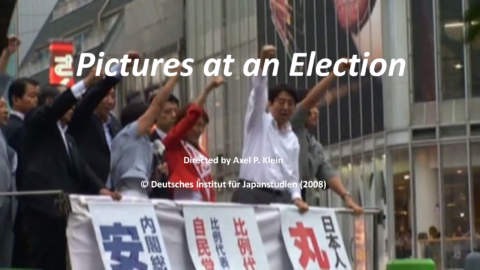 Pictures at an Election is a 68 min. documentary that shows Japan’s electoral machinery in full steam and focuses on the question of how Japanese candidates try to appeal to voters. It depicts different strategies and techniques, and presents a lively picture of political culture in Japan. It was filmed by political scientist and then DIJ senior research fellow Axel Klein (now Duisburg-Essen University, Germany) during the electoral campaigning in July 2007. Until today the documentary has been distributed for free to more than 100 universities all over the world. Since the pandemic has made on campus teaching impossible and online access to teaching material has become indispensable, the DIJ and Axel Klein have decided to publish the documentary on the DIJ’s YouTube channel. Coincidentally, the (unintended) protagonist of the documentary, Marukawa Tamayo, became Minister in charge of Women’s Empowerment and Gender Equality and Minister of State for the Tokyo Olympic and Paralympic Games in February 2021. This documentary shows how she started her political career with her first election campaign. Details
Pictures at an Election is a 68 min. documentary that shows Japan’s electoral machinery in full steam and focuses on the question of how Japanese candidates try to appeal to voters. It depicts different strategies and techniques, and presents a lively picture of political culture in Japan. It was filmed by political scientist and then DIJ senior research fellow Axel Klein (now Duisburg-Essen University, Germany) during the electoral campaigning in July 2007. Until today the documentary has been distributed for free to more than 100 universities all over the world. Since the pandemic has made on campus teaching impossible and online access to teaching material has become indispensable, the DIJ and Axel Klein have decided to publish the documentary on the DIJ’s YouTube channel. Coincidentally, the (unintended) protagonist of the documentary, Marukawa Tamayo, became Minister in charge of Women’s Empowerment and Gender Equality and Minister of State for the Tokyo Olympic and Paralympic Games in February 2021. This documentary shows how she started her political career with her first election campaign. Details
Torsten Weber quoted in Süddeutsche Zeitung article on Japanese history textbooks
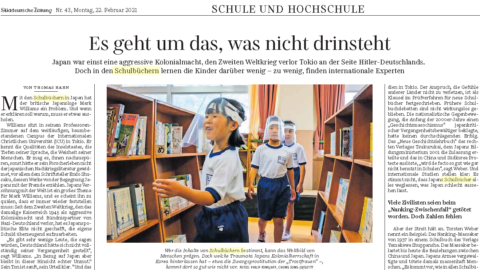
DIJ historian Torsten Weber was interviewed by the German daily Süddeutsche Zeitung for an article on the debate about history textbooks in Japan. Torsten explains that due to the so-called “neighbouring country clause” the majority of Japanese history textbooks presented a mainstream and relatively well-balanced narrative of Japanese imperialism and war-time aggression. The main objective of the textbooks was to prepare for entry exams. Consequently, they focused on teaching facts, causal relations, and omitted interpretations and controversial statements. Torsten gives the example of the Nanjing atrocities which are explicitly mentioned in the textbooks, including the victimization of Chinese civilians by the Japanese military. However, they avoided giving a number of victims as this remains a contested issue between the governments of Japan and the PR China. The article “Es geht um das, was nicht drinsteht” (It’s about what’s not in it) appeared in the print version of the SZ on 22 February and can be read online here.
DIJ researchers in Belgian and German media on Tokyo Olympics
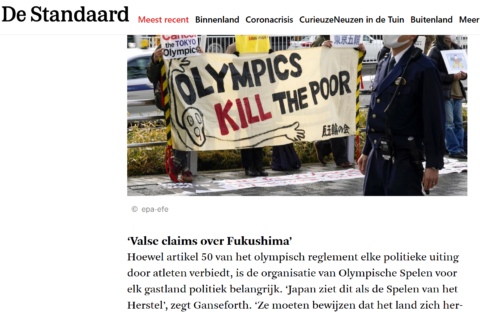
DIJ human geographer Sonja Ganseforth and historian Torsten Weber are quoted in newspaper articles in the Belgian daily De Standaard and the German weekly Die Zeit. Sonja comments on recent criticism in Japan of the Tokyo Olympics. “Activists have been criticizing the exorbitant spending and corruption in the run-up to the Games for years”, she is quoted in the article “Japanners vrezen dat Spelen zullen fungeren als superverspreider” (Japanese fear that Games may act as superspreader). “The expensive postponement due to the Covid crisis also leads to skepticism”, Sonja says. Torsten’s comments on how the Tokyo Olympics have become linked to promoting nationalism in Japan are quoted in “Olympia 2021 in Japan: Japans Nationalisten und ihr Plan mit den Spielen” (Japan’s nationalists and their plan with the Games). Their research on the impact of the 2020 Olympics on Japanese society is part of the DIJ’s special project on the Tokyo Olympics and the open access book publication Japan Through the Lens of the Tokyo Olympics.
Online cooperation meeting with University of Vienna
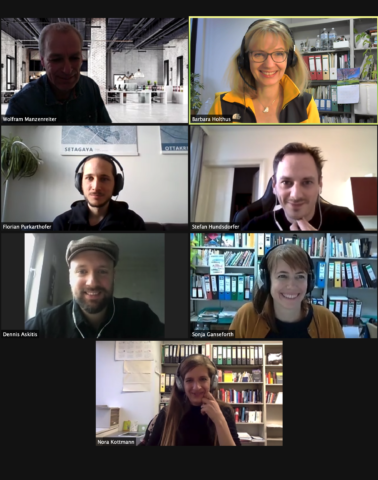
On February 4, seven researchers from the DIJ and its cooperation partner at the University of Vienna met online. Due to the pandemic, Vienna doctoral students are forced to modify their Japan research: travel to Japan has not been possible for over a year, and the doctoral students turn to hiring a Japanese company to conduct survey research on their behalf. DIJ deputy director Barbara Holthus and DIJ researchers Sonja Ganseforth and Nora Kottmann, who have all conducted their own surveys in Japan provided hands-on advice on research companies, costs involved, possible sampling strategies, questionnaire construction and the importance of sharei (incentives). Former DIJ PhD students Florian Purkarthofer and Dennis Askitis as well as Stefan Hundsdorfer, who are all currently doctoral students at Vienna, attended the meeting. It was part of the tight-knit cooperation between the DIJ and Japanese Studies at the University of Vienna. The cooperation started in 2010 with Wolfram Manzenreiter, who also participated in the online meeting, joining the editorial board of Contemporary Japan. Since 2014, one DIJ researcher per year has been teaching a class in Vienna.




 Open Access
Open Access
